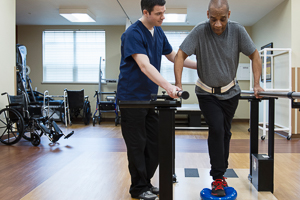Stroke: Your Rehabilitation Team
Topic Overview

Rehabilitation after a stroke usually involves a number of health professionals. These may include the following people.
Doctors and nurses
- Rehabilitation doctor. The rehabilitation doctor is in charge of your medical care after a stroke. This may be a physiatrist (a doctor who specializes in physical medicine and rehabilitation), a neurologist, or a primary care doctor.
- Rehabilitation nurse. A rehabilitation nurse specializes in nursing care for people with disabilities. He or she can provide nursing care and helps doctors coordinate medical care. A rehabilitation nurse can also educate both you and your family about recovering from a stroke.
Rehabilitation therapists
- Physical therapist. A physical therapist evaluates and treats problems with movement, balance, and coordination. The physical therapist can provide you with training and exercises to improve walking, getting into and out of bed or a chair, and moving around without losing your balance. The physical therapist also teaches your family members how to help with exercises and how to help you move or walk, if needed.
- Occupational therapist. An occupational therapist helps you relearn skills that you lost as a result of your stroke. He or she may have you do exercises and practice activities so that you can learn to do the things you could before, such as eating, bathing, dressing, writing, or cooking. You may not be able to do these activities the same way as before, so the therapist may teach you new ways to do them.
- Speech-language therapist. A speech-language therapist can help you get back your language skills and learn other ways to communicate. The speech-language therapist may teach your family members how to improve communication with you as well. Speech-language therapists also work with people who have swallowing problems caused by a stroke.
- Recreational therapist. A recreational therapist can help you return to activities that you enjoyed before the stroke, such as playing cards, gardening, bowling, or doing church and community activities. Recreational therapy can help you practice and relearn physical activities and thinking skills needed for activities you like.
Professional counselors
- Social worker. A social worker can help you and your family make decisions about rehabilitation and plan your return home or to a new living place. He or she can help you and your family answer questions about insurance and other financial issues and can help you with a variety of support services. Social workers also provide or arrange for counseling to help cope with emotional adjustments after a stroke.
- Licensed counselor or psychologist. A professional counselor or a psychologist can provide counseling to help you or your family members adjust and cope after a stroke. Counselors may use interviews and tests to identify and understand where you are having trouble. They may help you with thinking or memory problems or may work with other professionals to help you.
Other health professionals
- Orthotist. An orthotist can fit you with special braces, splints, or footwear that help with movement, correct deformity, and relieve pain.
- Dietitian. A dietitian can help you plan a balanced diet during rehabilitation. You may need a special diet if you have swallowing problems. The dietitian may also educate your family about helping you stay on a healthy diet after you leave the rehab program.
- Vocational counselor. A vocational counselor can help you find a job or get back to work after a stroke.
References
Other Works Consulted
- Winstein CJ, et al. (2016). Guidelines for adult stroke rehabilitation and recovery: A guideline for healthcare professionals from the American Heart Association/American Stroke Association. Stroke, published online May 4, 2016. DOI: 10.1161/STR.0000000000000098. Accessed June 3, 2016.
Current as of: September 26, 2018
Author: Healthwise Staff
Medical Review:E. Gregory Thompson MD – Internal Medicine & Martin J. Gabica MD – Family Medicine & Adam Husney MD – Family Medicine & Richard D. Zorowitz MD – Physical Medicine and Rehabilitation
Topic Contents
This information does not replace the advice of a doctor. Healthwise, Incorporated, disclaims any warranty or liability for your use of this information. Your use of this information means that you agree to the Terms of Use. Learn how we develop our content.

